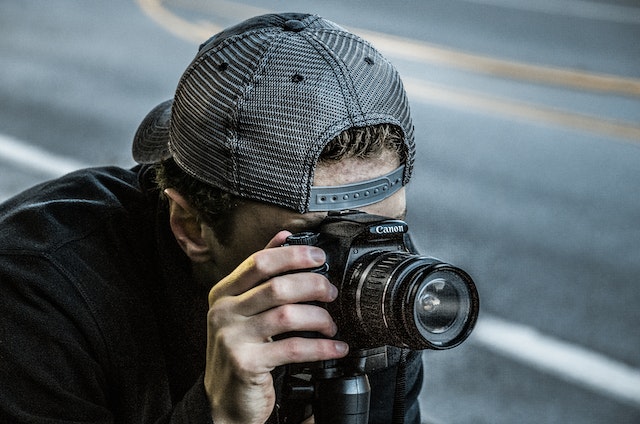
If you or your staff have encountered someone filming on or outside your utility’s property, especially someone who challenges your authority to ask them to stop, you may have encountered a First Amendment Auditor.
First Amendment Auditors are activists who use their right to free speech and assembly to monitor and document police interactions in public spaces, as well as those by other public officials and staff. First Amendment Auditors have visited some AEA member offices.

“These visitors can be difficult to deal with,” AEA Executive Director Peg Gallos said. “Members who have experienced these activists’ visits recommend doing staff training and creating policies to address them fairly, legally, and with a minimum of disruption.”
These individuals use their cameras as a tool to measure compliance with the First Amendment, looking for potential violations of civil liberties that have gone unnoticed or ignored by authorities.
Often, they travel to police stations, government buildings, and other restricted areas to film interactions between public employees and citizens, ostensibly with the goal of ensuring that public servants behave professionally and do not violate citizens’ civil rights. Some police departments have accused them of interfering with police work or “cop-watching,” while Auditors argue that they are simply exercising their constitutional rights and holding public servants accountable.
However, some auditors seem to deliberately provoke those they film or engage in aggressive behavior, seeking to, it appears, intentionally escalate situations. These auditors often post their recordings on YouTube, and they can sometimes be provocative, intentionally seeking to cause disruption for the purposes of “entertainment” or Youtube views. For example, they may aggressively pepper staff with confrontational questions or request access to secured areas even when it’s clear the request will be denied.
It’s important to note that in general, individuals have the right to film or take pictures of anything and anyone visible from a public space, as long as they are not interfering with government activities. This includes public servants such as police officers and other public employees. There have been several court cases that have affirmed this right, including Glik v. Cunniffe (2011), which held that filming police officers in public is a constitutionally protected right, and Turner v. Driver (2017), which found that citizens have a First Amendment right to film police officers during traffic stops.
However, there are some limitations. For example, you are not allowed to interfere with the work of the public servants, you cannot enter certain restricted areas or private property without permission to film, and laws against harassment still apply. There may also be some limitations based on state laws and local ordinances, such as restrictions on filming in certain public areas or recording conversations without consent.
Note that New Jersey is a one-party consent state when it comes to filming and recording. This means that as long as one party (such as the person recording the conversation) knows and agrees to the recording, it is legally permissible. However, using a recording for illegal purposes, such as blackmail or harassment, is still a crime regardless of the state’s consent laws.
First Amendment Audits are not looking for blackmail. However, they often are looking for attention in order to generate views for their Youtube or TikTok channels.
“If the interaction between public employees and the auditor begins to devolve or turns aggressive, this is often leaned into by the auditor. The more ‘entertainment value’ the video has, the more likely it is to generate more views online, which translates into more income via advertising for the auditor who posts it,” said Kevin Whitney, Senior Advisor at Cape May County MUA (CMCMUA).

Whitney said that after a presentation by the Cape May County League of Municipalities, his organization put a guidance document together to help staff and leadership deal with the issue, if and when it arose. The document is still in draft form, but can be made available to AEA members after it has been reviewed and finalized.
“We also resolved to revise our Administration Building Access and Visitor Policy so that it included information regarding these audits, as well as clearly defining ‘public spaces’ in the building through the policy and signage. Defining ‘public space’ will help to keep members of the public (i.e. auditors) in those public spaces, such as our front lobby or public meeting room on board meeting days, as opposed to having them free to move about the building upon entering.”
Whitney said he has seen videos of auditors trying to enter any door or room that was not explicitly secured. Because of this, having better signage, better managing public and open house events, and training staff on how to deal with auditors is essential. The organization’s document outlines what staff can expect from such a situation, how to report an event, and provides some scripted examples of how best to interact with an auditor.
“I also want to mention that it is stated several times that should an employee ever feel unsafe or that the building is at risk, they should contact the police,” Whitney said. “While we respect the citizen’s First Amendment rights, we do not expect our employees to feel unsafe or harassed at their place of work. Ultimately, while a citizen is entitled to their First Amendment rights and access to a public building, the Authority has the right to define those public spaces and employees have the right to carry out their work, for the good of the public, without being harassed or otherwise interfered with.”
In the event that you encounter a First Amendment auditor, remain aware of your surroundings and respectful of the rights of all parties involved. Avoid physical contact or confrontational behavior, as this not only could escalate into an unnecessary altercation, it may be exactly what the person filming wants. While not all auditors behave this way, many are purposely trying to “bait” public officials into a confrontation so they can catch it on camera.
Additionally, it is best to keep one’s distance from the auditor to reduce tension and maintain a safe environment. If you believe the auditor is trespassing or otherwise engaging in illegal activity, call the police rather than deal with it yourself.
Also, remember that if you are being recorded. Your statements and actions are likely to end up on the Internet. That means if you work for a public agency, you effectively represent that agency during the time you are being filmed. Act accordingly, no matter how much they try to provoke you. The actions of these auditors can be unwelcome and annoying, but in many cases – though not all – they may be legal.